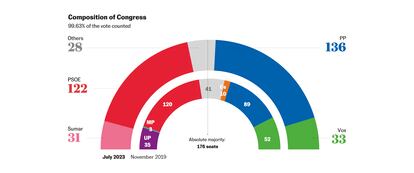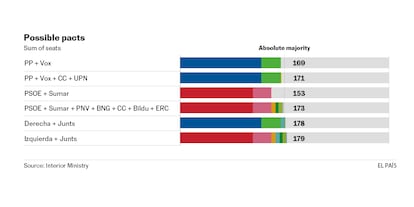In Spain, the left’s resistance thwarts a PP-Vox majority and leaves all possibilities open
The mainstream conservatives led by Alberto Núñez Feijóo win the most seats, but Prime Minister Pedro Sánchez’s Socialists have added votes and seats from the last election and will seek to craft a governing alliance

Just a week ago, Spain’s Popular Party (PP) dreamed of 168 seats and a landslide victory that would allow it to govern the country alone, without the need for the far-right Vox. But a much greater resistance from the left than expected, with a Socialist Party (PSOE) that against all odds has amply surpassed its 2019 results, has left PP leader Alberto Núñez Feijóo with such a narrow victory that not only will he not be able to govern alone — he will not even be able to achieve a sufficient majority with Vox.
The result in terms of votes is even more surprising than the one reflected in the seats: the PP wins the election by less than 300,000 votes. It is a victory, but a small one, very similar to that of José María Aznar in 1996, which leaves a very bad taste in the mouth of the PP leadership, which at no time doubted that they would obtain an absolute majority with Vox.
The results are so close that they leave everything up in the air. The parliament that emerges from Sunday’s vote could allow Prime Minister Pedro Sánchez, of the Socialist Party (PSOE), to repeat his majority, although for that he would need an abstention by Junts, the Catalan pro-independence party. The outcome also makes it very difficult for Feijóo to become the next PM, because he does not have the support to be invested as such, unless there are changes in the initial positions of key players such as the Basque Nationalist Party (PNV).
“The involutionist bloc has failed. There are more Spaniards who want Spain to move forward and it will continue to be so,” shouted a euphoric Sánchez as the PSOE’s grassroots followers shouted “No pasarán” (They shall not pass, a cry used by Republicans during the Spanish Civil War) at the door of its headquarters. “They have made the sum of the right fail,” admitted Santiago Abascal, leader of Vox.

The surprise and frustration on display at PP headquarters on Génova street in Madrid was in stark contrast to the uncontainable joy at PSOE headquarters on Ferraz street. Despite the left’s electoral defeat, which Feijóo will try to exploit to demand that the Socialists abstain in order to let him govern, Sánchez has achieved something that seemed impossible less than two months ago, when he decided to take the umpteenth leap into the void by bringing forward the general elections right after the leftist debacle of the regional and municipal elections of May 28: to improve his 2019 results in votes — more than 700,000 — and in seats — two more — and be able to dream of a parliamentary majority that would be even more complex than the current one but not impossible. The Socialists believe that an abstention by Junts could be enough to obtain a majority greater than that of the PP with Vox and the support of UPN and Coalición Canaria, two small parties from Navarre and the Canary Islands, respectively.
The resulting situation in Congress following Sunday’s vote is very complex, almost impossible to solve. The possibility of deadlock is a fact, although the disaster of the last repeat election, in 2019, may serve as an antidote to avoid that temptation. At the moment there are two possible majorities, based on what each of the parties has been saying, although there are many weeks of complex negotiations ahead.
On the one hand, there is the most obvious one, that of the PP with Vox, UPN and Coalición Canaria, a party that many associate with the PP because they are governing with them in the islands. But this sum remains at 171 seats, far from the absolute majority that Feijóo had dreamed of and which many polls took for granted in recent weeks.
The other possible majority is that of the PSOE with Sumar, which has managed to hold on to 31 seats — United We Can had 135 — although it has fallen 20,000 votes short of third place, which once again goes to Vox. To them would have to be added, as it has now, the votes of the PNV, the pro-independence Catalan Republican Left (ERC), the far-left Basque Bildu party and the Galician Nationalist Bloc (BNG), something that seems feasible for an investiture vote, although it is always complex. These groups total 172 seats, one more than the 171 of the PP bloc.
But here the decisive key would be held by Junts, the party of Carles Puigdemont, the former Catalan premier who pushed forward an illegal independence referendum, then fled to Belgium to avoid prosecution. In this formula, Sánchez would not need the affirmative vote of Junts to become the next prime minister, something difficult to imagine, but an abstention would be enough.
Still, it is an even more complex majority than the current one, so there is still a long match ahead to clarify which of the two options could prevail or whether the deadlock leads to new elections. “We will not make Pedro Sánchez the PM in exchange for nothing,” warned Miriam Nogueras, head of the Junts list, on election night. The pro-independence parties may be decisive, but their results in Catalonia have been disastrous for them. A total of nine seats have been lost in these elections, which have gone particularly well for the Catalan Socialist Party (PSC).
Meanwhile, Feijóo will be feeling very frustrated because he knows that despite having won by the minimum number of votes and having 14 seats more than the Socialists, it is perfectly possible that he will not be able to govern. The former Galician premier, who came from four landslide absolute majorities in his home region, did not leave the Galician regional government simply to remain as leader of the opposition to Sánchez.
The first leaders consulted on election night privately showed their disappointment and openly spoke of a deadlock, so that the possibility of governing, which they took absolutely for granted a few days ago, was not on the table. The final stretch of Feijóo’s campaign has been especially disastrous, especially after his terrible mistake in a TVE interview, where he provided false information and, far from correcting himself, challenged the journalist who pointed it out to him, Silvia Intxaurrondo, to apologize. Then Feijóo decided not to go to the four-way debate, something that many considered another mistake, and watched as the controversy over his friendship in the 1990s with the drug trafficker Marcial Dorado was revived.
Now the PP leader will try at all costs to get Sánchez to let him govern with his abstention, as he already pointed out during the campaign, but the chances of that happening are minimal and even more so with such a narrow result in votes and seats.
Meanwhile, Sánchez has once again achieved something that seemed impossible, as almost always in his political career. The politician who many thought was a goner after the municipal elections has had a very uneven campaign, which started very strongly and then fell apart with a face-to-face debate in which he had a very bad day at the worst possible moment. But Sánchez’s ability to pick himself up again and again after falling was seen again starting last weekend, when he regained his strong messages at rallies.
Last week, some polls that could not be published by law but were still being carried out already showed that there was a strong recovery of the left-wing vote, especially among the socialists. Yolanda Díaz, the leader of Sumar, also showed a much higher resistance than expected and started to recover many votes in the last days, especially after the four-way debate in which she was the one who stood out the most. Diaz was euphoric and spoke openly of a victory on this election night. “There were many people worried, but today I believe that people will sleep more peacefully. Democracy has won, it has been reinforced. We have won,” said an excited leader, her voice breaking. Díaz has managed to rebuild the space to the left of the PSOE and thus guarantee its continuity and even the possibility of governing again in coalition with the Socialists.
Meanwhile, Vox has had a discreet result, although it has managed to maintain third place, but those seats may be useless, the worst nightmare for Santiago Abascal, who already saw himself as the deputy PM of Spain after reaching a pact with the PP in Castilla y León, the Valencia region and Extremadura. The Spanish far right remains impressively strong, but if it does not manage to govern, its political failure will be significant because, in addition, the recovery of the PP makes the relationship increasingly unbalanced in favor of the large party, which will make Vox increasingly irrelevant.
The campaign, the PP’s pacts with Vox and a dizzying last week of campaigning, which has clearly mobilized the progressive vote much more than expected, have completely changed the predicted scenario and have halted what almost everyone took for granted, that is, a government of Feijóo with Abascal. All eyes will now be on the leader of the PP, who had everything he needed to govern and has failed in the attempt.
The Spanish political landscape is wide open and the investiture is up in the air. Spain has voted a tie between two blocs, but the numbers show that one of the two, that of the current majority, has one more seat. And that can be decisive to govern the country. If not, there will be a repeat election.
Sign up for our weekly newsletter to get more English-language news coverage from EL PAÍS USA Edition
Tu suscripción se está usando en otro dispositivo
¿Quieres añadir otro usuario a tu suscripción?
Si continúas leyendo en este dispositivo, no se podrá leer en el otro.
FlechaTu suscripción se está usando en otro dispositivo y solo puedes acceder a EL PAÍS desde un dispositivo a la vez.
Si quieres compartir tu cuenta, cambia tu suscripción a la modalidad Premium, así podrás añadir otro usuario. Cada uno accederá con su propia cuenta de email, lo que os permitirá personalizar vuestra experiencia en EL PAÍS.
¿Tienes una suscripción de empresa? Accede aquí para contratar más cuentas.
En el caso de no saber quién está usando tu cuenta, te recomendamos cambiar tu contraseña aquí.
Si decides continuar compartiendo tu cuenta, este mensaje se mostrará en tu dispositivo y en el de la otra persona que está usando tu cuenta de forma indefinida, afectando a tu experiencia de lectura. Puedes consultar aquí los términos y condiciones de la suscripción digital.









































